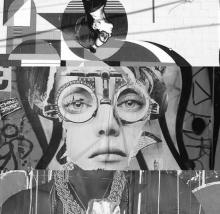Telling my story, in its most truthful sense, means telling a story of confusion and pain, but also one of resilience. I came to UW troubled and broken-hearted, seeking a purpose within my self—a self that I could come to love. I soon came to realize that I couldn’t be who I am in an academic setting if I took my personal struggles with depression, anxiety, eating disorders, and other traumas out of the equation, so instead I found ways to merge my personal self with my academic self. Through my studies of CHID, Medical Anthropology, Nutrition, and Art History, I found an interconnectedness that incited passion within my studies, and more importantly, an acceptance in being me. Written below are three different projects I’ve worked on for the past year, each of which embodies my desire of de-stigmatizing my mental health using artistic, creative, non-traditional, yet still academic, expressions. If you’d like more information on any of these projects or to view them in their entirety, please email me at hdoyle@uw.edu.
Study Abroad: Last summer during an intensive six-week CHID study abroad program in Lima, Peru, I fell to a new low within my mental struggles, which fortunately coincided with a high of creativity. The best way I could try to move within this pain was to design a final project regarding empathy and acknowledgement for the pain of others, including myself. Damaged Bodies, Hidden Truths: Empathetic Visions to Unveil an Alternative World is a creative project that tries to grapple with some of life’s darker themes. I wanted to consider hidden aspects of the body that remain unseen and undiscussed. How does internal battlement affect external behavior? I wrote a series of short stories inspired by the artists and activists we had met in Lima. Some of these stories include one written from the perspective of a pillow that catches the tears of a woman who has experienced sexual violence and one written from the perspective of a forced sterilized dog who belongs to a woman who has also undergone forced sterilization. I try to show an interesting cross-species connection between the human and the nonhuman and how suffering exists across all forms of life.
Focus Group: Returning from Peru, I wanted to continue to engage with these more hidden, uncomfortable parts of life. Because I am constantly trying to seek ways to foster discussions on the interconnectedness between mental health, critical engagement, and artistic expression, I decided to construct an on-campus CHID focus group entitled Mentally Unwell with No One to Tell: De-Stigmatizing Mental Suffering for Caring and Concerned Activists. Within this focus group, I facilitated conversations atypical of standard classroom settings in which the coupling of academic and personal is not often welcomed. Each 2-hour session welcomed a guest facilitator for a segment of the class (usually around 30-40 minutes) who would speak surrounding a certain theme I had chosen (i.e. debilitation, fragmented identity, dealing with discomfort). Then, after the guest left, we would spend the rest of the time period talking through ideas, often using personal experience to guide the conversation.
Additionally, I asked the participants to engage in their own creative nonfiction projects as a way of de-stigmatizing and reflecting on their personal mental suffering using whatever medium suited them best. Some examples of these projects included: a zine addressing compassion fatigue, a Tumblr themed around tears, a spoken word poem, etc. Through this experience of facilitation, I have been filled with gratitude from the sense of community and support the focus group has garnered. The group’s participants continually inspired me and, while these once-a-week seminars did not cure anyone’s depression or anxiety or what-have-you, the intimacy and trust we felt towards one another was extremely powerful and made us stronger both individually and collectively.
Thesis Research Seminar: As part of the CHID 490 Thesis class entitled Love & Attraction, I wanted to create a project further addressing the intimacies of my own mental health. I proposed to find ways of attraction between my depression and myself. I was not wishing to fall in love with my depression in traditional ways, to glorify it, or romanticize it. Rather, through this marriage, I wanted to make my depression productive—through the technology that is love. My project, entitled A Body in Battle: Love Letters to Break Wounds, is about moving away from my perpetual debilitation and to instead face my internal struggling head-on, pen-first. In this non-traditional courtship, I finally gave a voice to my depression through a series of “love letters” addressed to specific triggers. And the depression wrote back to me. Using this style of creative nonfiction, I wanted to explore my whole self through trying to formulate a narrative of me: one that, through time and repetition, may hold the possibility of making sense of all the isolated fragments. Within these love letters, production came from the interactions between depression and myself. Our “love” became a technological powerhouse that activated rather than debilitated. We move each other, expand each other, and change each other—as any love has the potential to do.
What’s Next: I just interviewed for an internship at Circle of Friends for Mental Health where I hope to continue work on interweaving mental health and art within Seattle. I’m also looking into applications for graduate programs, specifically the Narrative Medicine program at Columbia University and the History of Consciousness program at UC Santa Cruz.
--By Haley Bosco Doyle
